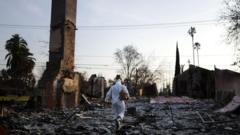In response to the devastating recent wildfires in Los Angeles that destroyed thousands of homes and claimed lives, the Grammy Awards will shift their celebration towards fundraising efforts and recognizing those affected. While many customary events are canceled and concerns remain about the optics of a glamorous ceremony during tragedy, showrunners aim to honor resilience and unity in the music community.
Grammy Awards to Adapt Amid Historic LA Fire Devastation

Grammy Awards to Adapt Amid Historic LA Fire Devastation
The upcoming Grammy Awards are set to transform their format in light of the unprecedented fires ravaging Los Angeles, focusing on community support and reflection.
The week before the Grammy Awards usually buzzes with vibrant parties, attracting music's elite to Los Angeles—the entertainment industry's heart. However, this year, all that glitz is overshadowed by destruction, as the city grapples with its worst fire disaster, which ravaged the region for 24 consecutive days. Nearly 30 fatalities, alongside the destruction of over 16,000 residential and commercial buildings, have left many musicians and industry professionals bereft of homes and gear. Consequently, the once-exuberant lead-up to the awards has transformed into a realm of fundraising and support for those impacted.
Initially uncertain about proceeding, the Recording Academy—organizers of the Grammys—concluded that the show is more crucial than ever, with plans to leverage the event for charitable purposes. The CEO of the Academy, Harvey Mason Jr., emphasized the decision to hold the ceremony as a potential beacon of hope, stating that this year’s Grammy Awards must honor victims while embodying the spirit of resilience that characterizes Los Angeles.
Mason described the format as a reimagining, with a toned-down red carpet atmosphere aimed at reflecting on the city's suffering. Public officials, including local authorities, supported the continuation of the event. Yet, voices within the industry, like creative director Elyn Kazarian, expressed that holding the awards might appear insensitive against the backdrop of devastation, where celebrities parade in designer outfits while others face tragedy.
With a commitment to making the ceremony relevant, the show will incorporate themes reflecting the fires that have impacted LA deep into its structure. Executive producer Ben Winston described his vision of casting Los Angeles itself as a key character during the awards, with tributes to first responders woven throughout. After successfully raising more than $60 million for fire relief during a recent concert, the Grammys are set to run eight hours, awarding 94 categories, and showcase performances from big names such as Beyoncé, Taylor Swift, and Stevie Wonder.
This isn’t a first for the Grammys to adapt; past events have restructured due to circumstances like the COVID-19 pandemic, but industry insiders note that the immediate impact of the fires has led to a rapid response aimed at recovery rather than prolonged distress. Artists who personally faced losses, alongside those in the emerging talent pool, rely on Grammy week for visibility and connections within the competitive music landscape. However, Spotify's decision to cancel all Grammy Week events reinforces the sentiment that now is the time to channel resources towards recovery efforts, fostering a sense of unity within the industry.
In these trying times, resilience permeates the music community. While the city has faced unprecedented hardship, insiders believe that hope and the collaborative spirit will persist, ensuring that Los Angeles retains its stature as a global music hub despite the overwhelming challenges ahead.




















